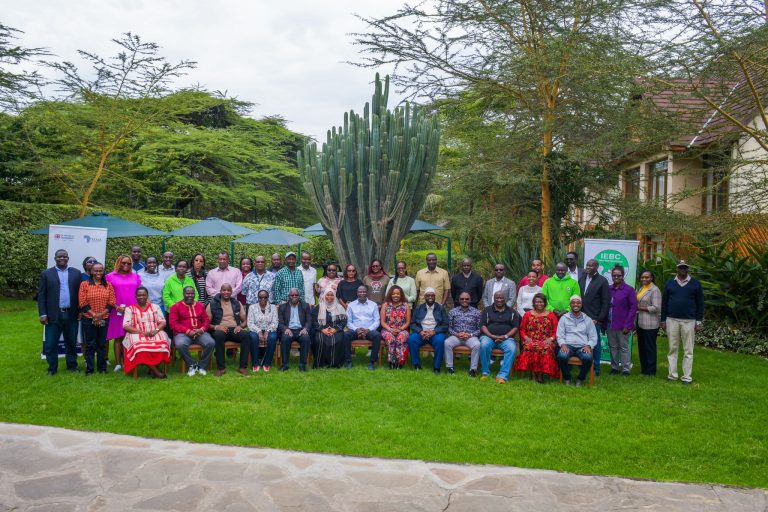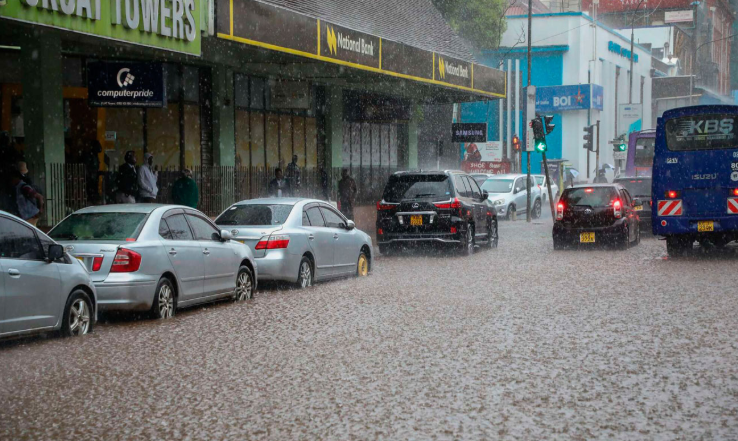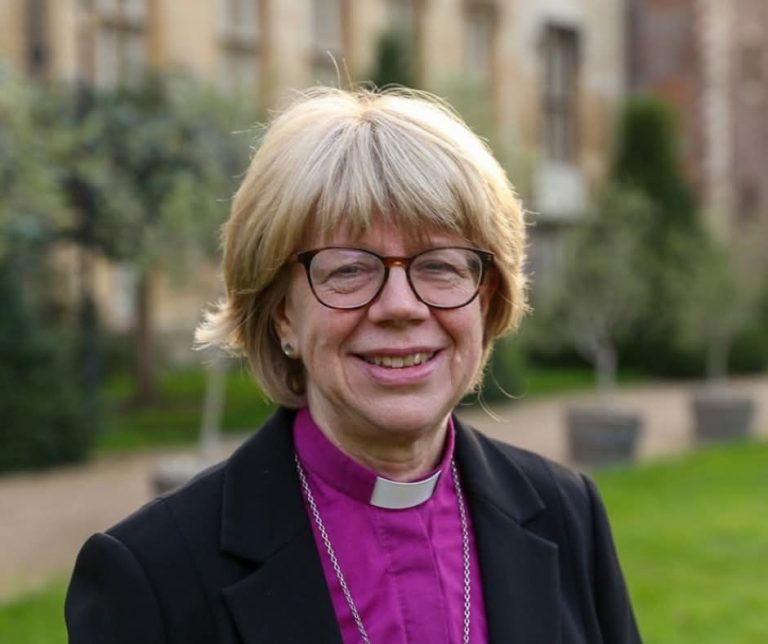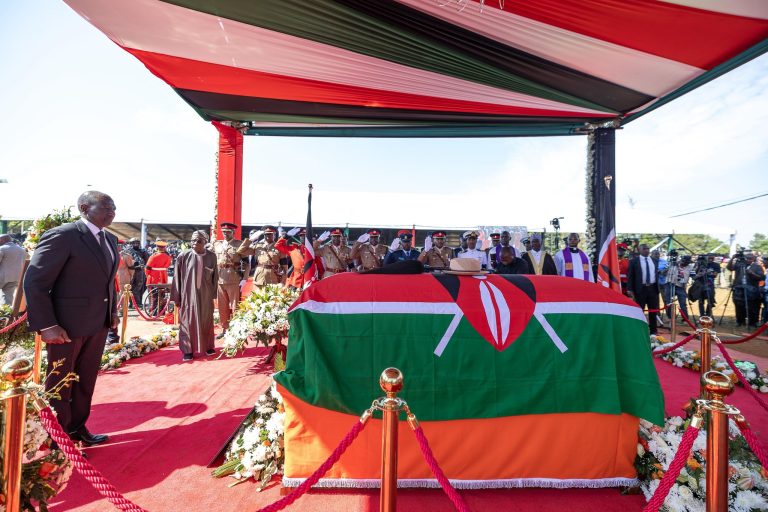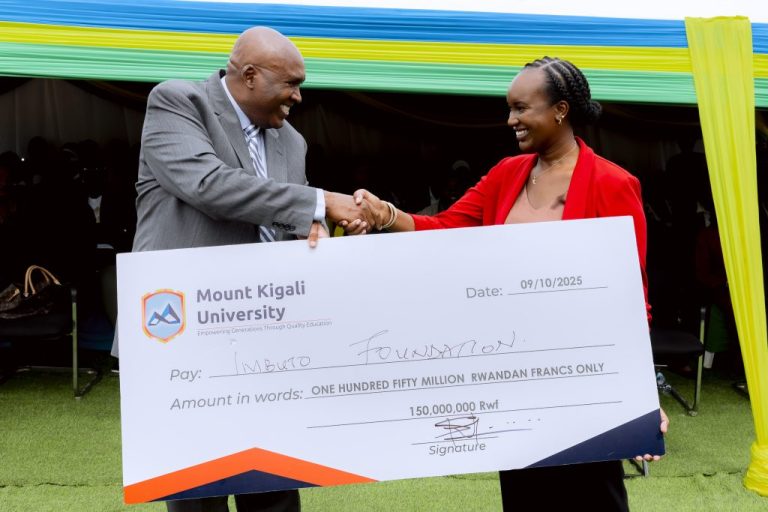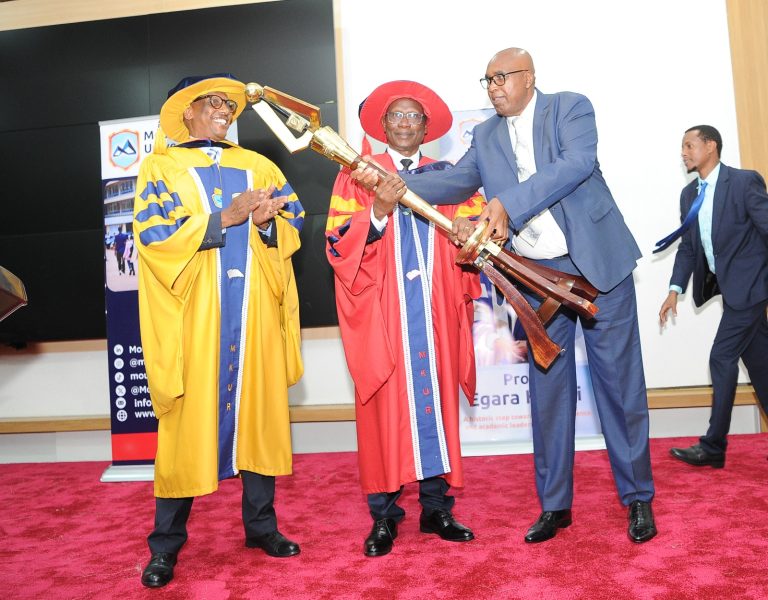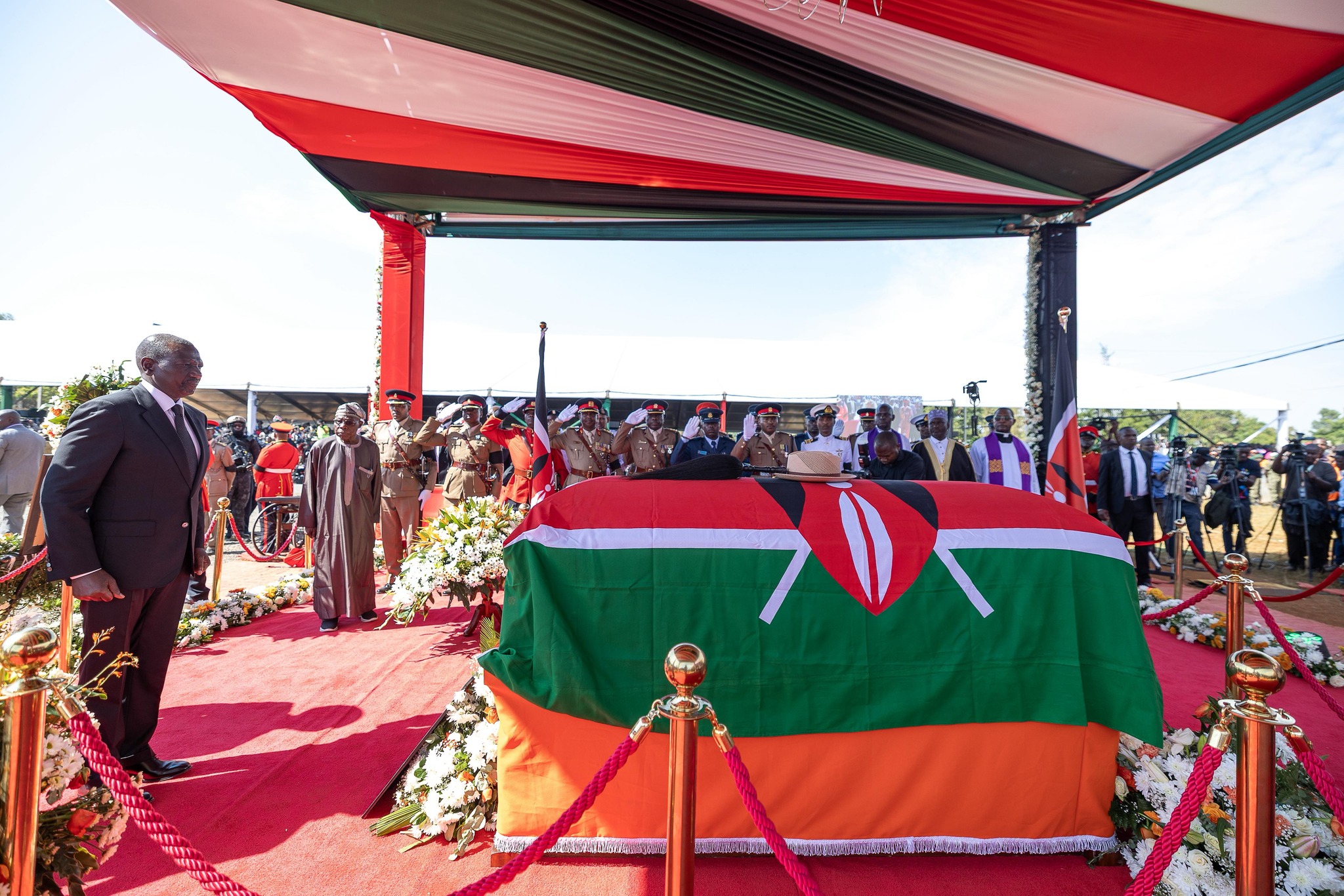
President Dr. William Ruto pays his respects to former Prime Minister, the late Raila Odinga, at Jaramogi Oginga Odinga University of Science and Technology on October 19, 2025
By Joseph Mathenge — CNN Award-Winning Journalist
BONDO, Kenya — October 19, 2025
The lakeside town of Bondo fell into a reverent silence on Sunday. Streets that once roared with political chants now whispered with prayer and song as Kenya laid to rest one of its most enduring sons, Raila Amolo Odinga, the man many called “the soul of the nation.”
Under the fierce Nyanza sun, thousands of mourners, young and old, believers and skeptics, rich and poor, lined the narrow roads leading to Kang’o Ka Jaramogi. Some waved flags, others clutched portraits of the man who had been their voice for over half a century. And when the flag-draped coffin appeared, escorted by a full military procession, even the air seemed to hold its breath.
It was a funeral unlike any other in Kenya’s history, a state farewell for the man who engineered its democracy.
A State Funeral in Nyanza — History Finds Its Balance
“This is the first time we have had a state funeral in Nyanza,” Governor James Orengo declared, his voice breaking. “When we once asked for the same honor for Jaramogi Oginga Odinga, they refused. But today, history has corrected itself.”
Indeed, President William Ruto had ordered a full State Funeral, complete with military honors, a 17 -gun salute, and the ceremonial “Last Post.” It was a symbolic act that carried the weight of reconciliation, of two political titans whose rivalry once defined Kenya’s democratic landscape.
For the people of Nyanza, it wasn’t just a farewell. It was vindication, the long overdue acknowledgment of a man who had stood up to power, shaped opposition politics, and given Kenya its conscience.
The Man Who Never Bowed
Raila Odinga’s life reads like the blueprint of Kenya’s democracy.
He was jailed, exiled, betrayed, celebrated, yet never broken.
“Many politicians fell along the way, but Raila stood,” said Orengo, himself a former detainee and Odinga’s lifelong ally. “He stood for democracy. He stood for truth. He stood for Kenya.”
When his election victories were disputed, he did not fade quietly. He declared himself “The People’s President” and took an oath in defiance, a symbolic act that electrified his followers and unsettled the establishment.
“He was never afraid,” Orengo added. “He taught us that democracy cannot be postponed.”
Even in his twilight years, tear-gassed on Nairobi’s streets during protests, Raila remained the embodiment of resistance the engineer who refused to abandon his own construction.
Tears, Tributes, and the Final Guard
Inside the sprawling funeral grounds, emotions spilled freely.
Former Prime Minister Musalia Mudavadi revealed that even India had honored Raila with a military escort before his body was flown home aboard a Kenya Airways plane renamed RAO 001.
His longtime aide, Maurice Ogeta, stood motionless behind the coffin, the same position he had guarded in life. President Ruto acknowledged him personally:
“Morris, we will stand with you,” Ruto said, recalling how Ogeta once shined Raila’s shoes before becoming his most trusted aide.
It was a moment that captured the essence of Odinga’s politics, loyalty over privilege, duty over comfort.
Uhuru Kenyatta: “Thank You, Bondo”
Former President Uhuru Kenyatta, Raila’s political partner in Kenya’s “Handshake Era,” delivered a tribute that left many in tears.
“People of Bondo, thank you for the son you gave us,” he said. “He became not just Kenya’s conscience, but an African icon. He taught us that patriotism can exist without power.”
The crowd erupted, waving orange flags as chants of “Baba! Baba!” rolled through the fields.
From Obasanjo to Ruto — Africa’s Farewell
Former Nigerian President Olusegun Obasanjo, a close friend for three decades, called him “a sincere man whose convictions outlived politics.”
President Ruto, speaking as both rival and mourner, reflected on their final conversations:
“He told me he was going to Malindi. Then to India. When I received Oburu’s message that Baba was critical, I knew we had lost a pillar.”
He added quietly, “Some advised that we lower the level of honors. I said no. Raila was the People’s President, and he deserved the dignity of a Head of State.”
Winnie Odinga: “He Died Strong”
Then came Winnie Odinga, his youngest daughter, carrying both grief and grace.
“I was with him when he took his last breath,” she said softly. “He died in my arms.”
Her words drew sobs from the crowd. She thanked President Ruto “for honoring Baba” and then added, with a tone that hinted at a political dawn,
“In case you are wondering… I’m ready to come back home.”
Her statement rippled through the crowd. Analysts later called it “the moment the torch passed.” Winnie’s final line sealed it:
“The king is dead, but long live the crown. God bless Baba’s legacy.”
Ida Odinga: The Woman Behind the Revolution
When Ida Odinga rose, silence spread across the compound like wind before a storm. Dressed in deep black, her poise reflected a lifetime of resilience.
“When I was in college,” she began, “I swore never to marry a politician. Raila was an engineer, calm and full of dreams. Little did I know I was marrying a revolution.”
She paused, her eyes glistening.
“If I were to live again, I would still choose Raila. Because through him, I learned that love can endure storms, and purpose can outlive pain.”
It was perhaps the day’s most powerful tribute,from the woman who had borne the weight of prison years, political persecution, and public life with unflinching grace.
The Many Names of a Legend
They called him Baba — father.
Jakom — chairman.
Agwambo,- the mysterious one.
Tinga — the tractor that never stopped moving.
Joshua — the biblical liberator leading his people toward the promised land.
Each name was a story; together, they formed a legend.
The Final Salute
As dusk descended over Lake Victoria, soldiers took their positions.
A bugle call pierced the silence , The Last Post followed by a perfectly timed 21-gun salute that rolled like thunder across the plains of Bondo.
Each round was a heartbeat of a nation,raw, heavy, unrelenting.
Ida stood motionless, Winnie by her side. The flag on the coffin fluttered one last time. And when the final echo faded, it wasn’t just a man being laid to rest, it was an era closing, a dream fulfilled in the soil that first gave it life.
Legacy Beyond the Grave
Raila Odinga may never have worn the crown he sought, but in the eyes of millions, he reigned unmatched.
He was Kenya’s second Prime Minister, a prisoner of conscience, a freedom fighter, a builder of roads and revolutions. His greatest title, however, came not from a ballot or a decree, but from the hearts of his people: “Baba.”And as the sun sank behind the waters of Lake Victoria, one truth endured:
Kenya buried a man.
But his ideals, justice, democracy, equality, will never rest.
Because as long as there are Kenyans who dare to stand, Raila Amolo Odinga’s spirit will rise, again and again, in every dream for a freer nation.
About the Author
Joseph Mathenge is a CNN Award-Winning Journalist renowned for his human-interest reporting and powerful storytelling on Africa’s defining political and social moments

